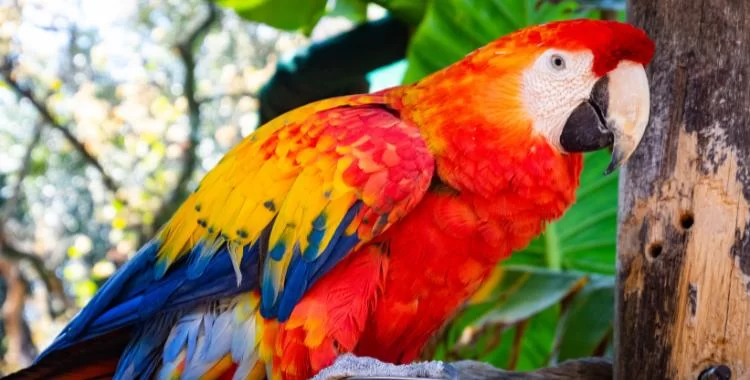- Importance-of-Tailored-Nutrition-for-Exotic-Birds
- Essential-Ingredients-for-Homemade-Bird-Seed-Mixes
- Step-by-Step-Guide-to-Making-Bird-Seed-Mixes
- Real-Life-Examples-and-Benefits-of-Homemade-Mixes
- Where-to-Find-Quality-Products-and-Support
1. Importance of Tailored Nutrition for Exotic Birds
Providing the right nutrition to exotic birds and parrots is fundamental to their health and longevity. Unlike common pet birds, exotic species often have very specific dietary needs that must be met to avoid malnutrition or illness. The commercial seed mixes available may not always offer a balanced profile of nutrients, often lacking essential vitamins, minerals, or fats that these birds require. By making homemade bird seed mixes for exotic birds and parrots, owners can tailor the diet to match the natural feeding habits of their feathered companions, ensuring optimal health.
Exotic birds come from diverse habitats, ranging from tropical rainforests to arid regions, and their diets reflect this. Parrots, for example, need a rich supply of nuts, fruits, and seeds, along with occasional protein sources. Understanding these differences is the first step in creating a seed mix that provides balanced nutrition and stimulates natural foraging behaviors, which is vital for the birds' mental and physical well-being.
1.1 Nutritional Components to Consider
When designing a seed mix, it is important to consider:
- Protein: Essential for growth and feather development, often sourced from legumes and certain seeds.
- Fats: Provide energy and aid in absorption of fat-soluble vitamins; nuts and sunflower seeds are good sources.
- Vitamins and Minerals: Vitamin A, calcium, and other micronutrients critical for immune function and bone health.
- Fiber and Carbohydrates: Important for digestion and sustained energy.
2. Essential Ingredients for Homemade Bird Seed Mixes
Choosing the right ingredients is key to a successful homemade bird seed mix. While the exact combination varies by species, some staples are commonly beneficial:
2.1 Seeds and Grains
Millet, safflower, quinoa, and canary seeds are excellent bases for many exotic birds. These grains are highly digestible and provide a range of nutrients. Incorporating a variety of seeds mimics natural diets and prevents nutritional gaps.
2.2 Nuts and Legumes
Incorporate almonds, walnuts, and cooked lentils or chickpeas. These provide healthy fats and protein but should be given in moderation due to their high fat content.
2.3 Fresh and Dried Fruits
Adding bits of dried apricot, raisins, or fresh papaya can enrich the mix with natural sugars and antioxidants, enhancing flavor and nutritional value.
2.4 Vegetables and Supplements
Powdered leafy greens, grated carrots, and occasional vitamin supplements may be mixed in for added micronutrients. It’s vital to avoid harmful foods such as avocado or chocolate.
3. Step-by-Step Guide to Making Bird Seed Mixes
Creating a homemade seed mix may seem daunting, but breaking it down into manageable steps makes the process straightforward and enjoyable.
3.1 Research Your Bird’s Specific Needs
Identify the species of your bird and research its natural diet carefully. Books, trusted websites, and veterinarians specializing in avian care provide valuable guidance.
3.2 Gather Fresh, Quality Ingredients
Purchase seeds, nuts, and dried fruits from reputable suppliers to ensure freshness and avoid contamination. Organic products are preferable where possible.
3.3 Mix and Store Properly
Combine ingredients in ratios suited to your bird’s needs. Store the mix in airtight containers away from direct sunlight to preserve freshness and prevent spoilage.
3.4 Monitor Your Bird’s Response
Observe changes in your bird’s appetite, plumage condition, and activity levels. Adjust the mix as needed, consulting with a vet if concerns arise.
4. Real-Life Examples and Benefits of Homemade Mixes
One parrot owner shared how switching from commercial seed mixes to a carefully balanced homemade blend transformed her bird’s health. Previously plagued by dull feathers and lethargy, after a few months on a customized seed mix that included a variety of nuts, seeds, and fresh fruit, the parrot displayed vibrant plumage and increased energy. This story echoes the experience of many exotic bird keepers who find that homemade mixes not only improve nutrition but also stimulate natural behaviors through variety and freshness.
Additionally, creating your own mixes allows control over ingredient quality and avoids additives or preservatives often found in commercial products. This leads to fewer digestive issues and enhanced immune resilience for your birds.
4.1 The Role of Hidden Brook Veterinary
For those interested in expert advice or sourcing high-quality ingredients and supplements, Hidden Brook Veterinary offers tailored products and services that support exotic bird health. Their knowledgeable team can help customize feeding plans and provide ongoing care recommendations, ensuring your bird’s diet remains balanced and enjoyable.
5. Where to Find Quality Products and Support
While homemade mixes offer flexibility, sourcing premium ingredients is critical. Specialty pet stores, health food markets, and trusted online retailers often carry a range of seeds, nuts, and dried fruits suitable for exotic birds. For supplementation and veterinary guidance, partnering with professionals like Hidden Brook Veterinary can make a significant difference. Their expertise in avian nutrition and health care ensures your birds receive the best possible support.
Regular consultations and health checks can catch early signs of dietary deficiencies, allowing you to adjust your homemade mixes accordingly and maintain your pet’s vitality.












